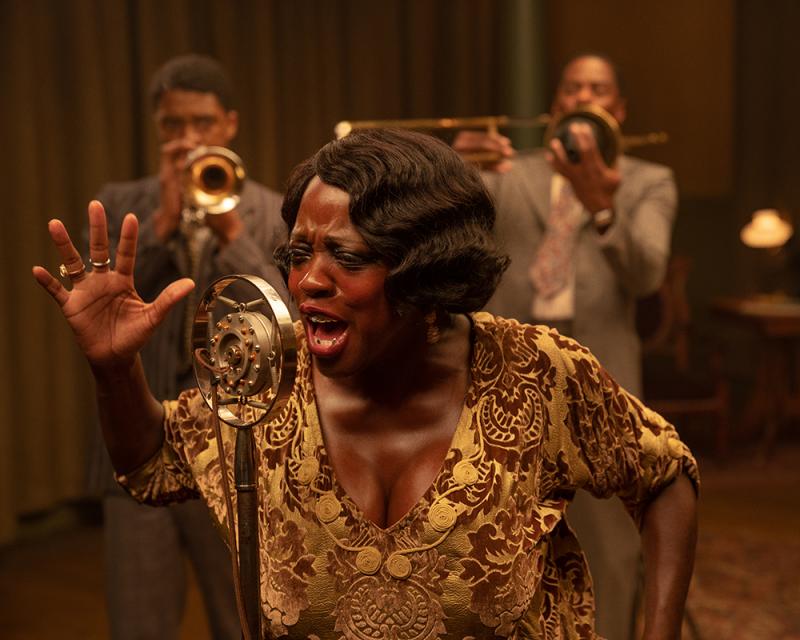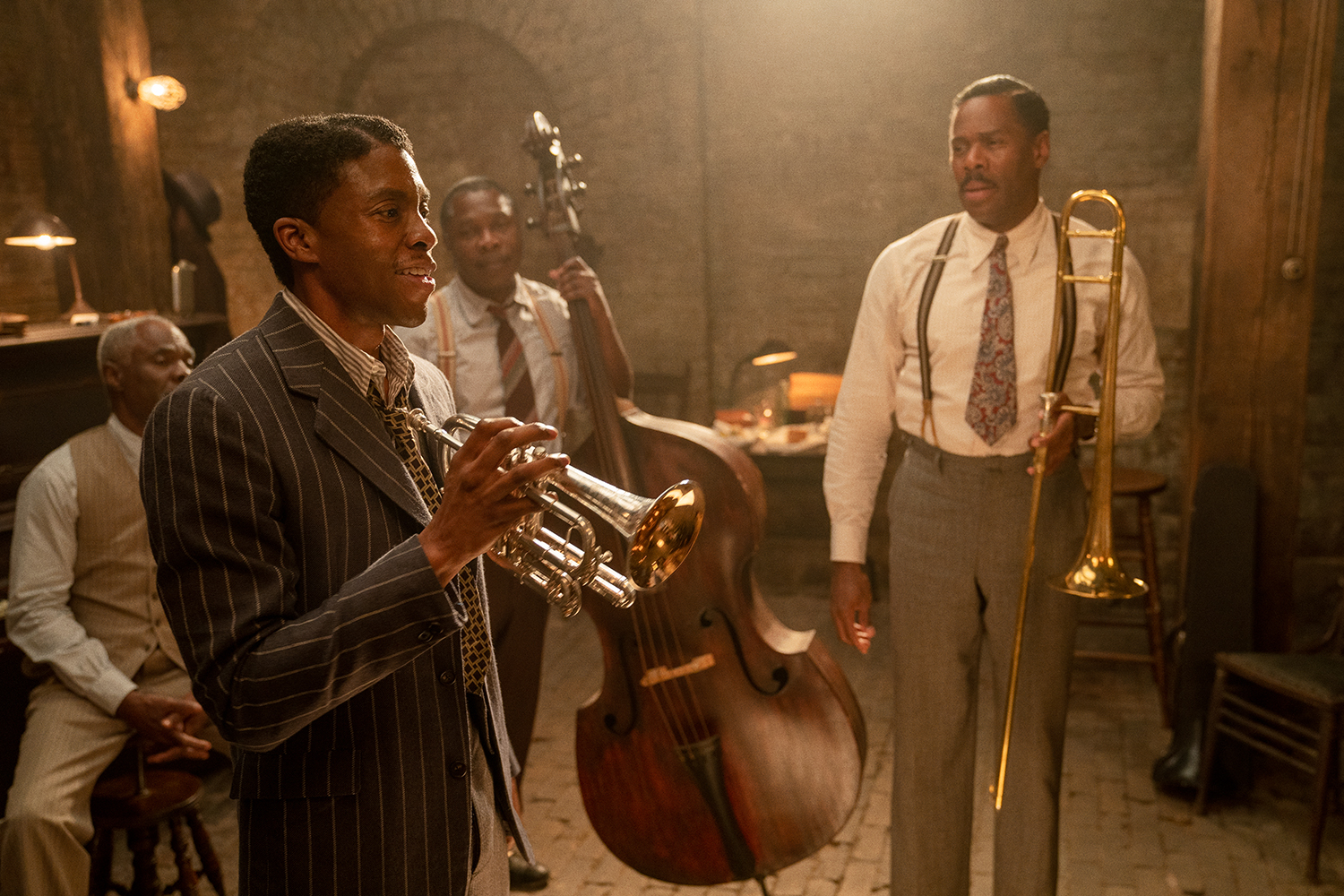Ma Rainey’s Black Bottom review - keeping things theatrical | reviews, news & interviews
Ma Rainey’s Black Bottom review - keeping things theatrical
Ma Rainey’s Black Bottom review - keeping things theatrical
George Wolfe's screen adaption includes terrific turns from Chadwick Boseman, Viola Davis and Colman Domingo

There was always bound to be a hint of melancholy watching George Wolfe’s Ma Rainey’s Black Bottom. Try as you might to focus on the film, you can never quite shake the fact that you’re watching the final performance of Chadwick Boseman, whose life was cut tragically short this year from bowel cancer.
This adaptation of Wilson’s play is the second in a ten-part cycle that chronicles the Black experience throughout the course of the 20th century. It’s produced by Denzel Washington, who himself starred in Fences, another Wilson play, back in 2016. This chapter focuses on the life of Ma Rainey, the originator of the Blues, with the title coming from her tune, "Black Bottom Dance".

Set for the most part in a sweltering Chicago recording studio in the 1920s, we meet three old-hat musicians: Cutler (Colman Domingo), Toledo (Glynn Turman), Slow Drag (Michael Potts), as well as the young and ambitious Levee (Boseman), who have gathered to work with Ma (Viola Davis) on a new album.
Wolfe has stayed true to the theatrical origins of the text. The film feels like a chamber piece, and each scene is a pressure cooker in which the quartet of musicians verbally (and sometimes physically) spar whilst sharing their struggles. The intensity is dialled up by swindling producers and of course the domineering presence of Ma (Viola Davis).
Davis’s performance crackles. Even when she isn’t in the room, her presence is felt. Davis captures Ma in all her complexity – a regal figure, fearsome yet vulnerable, who is alert to the potential of white producers stripping her music of its authenticity for white audiences. Physically, the scenes in the Jim Crow south see Ma in all her glory, smeared in grease paint with golden grills. Her eyes look wild, taking in each moment to make sure all other eyes are on her and no one else – which is why Levee presents such a threat.
Eager to steal the spotlight, Levee (Boseman) is intelligent and driven, but haunted. Eager to please producers, he wants to work the system in his favour in a less domineering manner than Ma, dreaming of being able to record his own songs. It’s a tremendous final performance, full of fury, anger and rage. He desperately wants to escape the racially motivated violence of his childhood and the ongoing racism he endures every day. Boseman’s potent performance will make you forget the tragedy, but when the credits roll you can’t help wondering what he might have achieved given more years.
Wolfe has crafted an impressive film. The production design looks stunning, the performances are standout, and the third act comes with an emotional wallop that causes you to choke. Yet, despite all these masterfully crafted elements, it still feels theatrical rather than cinematic.
rating
Share this article
The future of Arts Journalism
You can stop theartsdesk.com closing!
We urgently need financing to survive. Our fundraising drive has thus far raised £49,000 but we need to reach £100,000 or we will be forced to close. Please contribute here: https://gofund.me/c3f6033d
And if you can forward this information to anyone who might assist, we’d be grateful.

Subscribe to theartsdesk.com
Thank you for continuing to read our work on theartsdesk.com. For unlimited access to every article in its entirety, including our archive of more than 15,000 pieces, we're asking for £5 per month or £40 per year. We feel it's a very good deal, and hope you do too.
To take a subscription now simply click here.
And if you're looking for that extra gift for a friend or family member, why not treat them to a theartsdesk.com gift subscription?
more Film
 Robert Redford (1936-2025)
The star was more admired within the screen trade than by the critics
Robert Redford (1936-2025)
The star was more admired within the screen trade than by the critics
 Blu-ray: The Sons of Great Bear
DEFA's first 'Red Western': a revisionist take on colonial expansion
Blu-ray: The Sons of Great Bear
DEFA's first 'Red Western': a revisionist take on colonial expansion
 Spinal Tap II: The End Continues review - comedy rock band fails to revive past glories
Belated satirical sequel runs out of gas
Spinal Tap II: The End Continues review - comedy rock band fails to revive past glories
Belated satirical sequel runs out of gas
 Downton Abbey: The Grand Finale review - an attemptedly elegiac final chapter haunted by its past
Noel Coward is a welcome visitor to the insular world of the hit series
Downton Abbey: The Grand Finale review - an attemptedly elegiac final chapter haunted by its past
Noel Coward is a welcome visitor to the insular world of the hit series
 Islands review - sunshine noir serves an ace
Sam Riley is the holiday resort tennis pro in over his head
Islands review - sunshine noir serves an ace
Sam Riley is the holiday resort tennis pro in over his head
 theartsdesk Q&A: actor Sam Riley on playing a washed-up loner in the thriller 'Islands'
The actor discusses his love of self-destructive characters and the problem with fame
theartsdesk Q&A: actor Sam Riley on playing a washed-up loner in the thriller 'Islands'
The actor discusses his love of self-destructive characters and the problem with fame
 Honey Don’t! review - film noir in the bright sun
A Coen brother with a blood-simple gumshoe caper
Honey Don’t! review - film noir in the bright sun
A Coen brother with a blood-simple gumshoe caper
 The Courageous review - Ophélia Kolb excels as a single mother on the edge
Jasmin Gordon's directorial debut features strong performances but leaves too much unexplained
The Courageous review - Ophélia Kolb excels as a single mother on the edge
Jasmin Gordon's directorial debut features strong performances but leaves too much unexplained
 Blu-ray: The Graduate
Post #MeToo, can Mike Nichols' second feature still lay claim to Classic Film status?
Blu-ray: The Graduate
Post #MeToo, can Mike Nichols' second feature still lay claim to Classic Film status?
 Little Trouble Girls review - masterful debut breathes new life into a girl's sexual awakening
Urska Dukic's study of a confused Catholic teenager is exquisitely realised
Little Trouble Girls review - masterful debut breathes new life into a girl's sexual awakening
Urska Dukic's study of a confused Catholic teenager is exquisitely realised
 Young Mothers review - the Dardennes explore teenage motherhood in compelling drama
Life after birth: five young mothers in Liège struggle to provide for their babies
Young Mothers review - the Dardennes explore teenage motherhood in compelling drama
Life after birth: five young mothers in Liège struggle to provide for their babies

Add comment